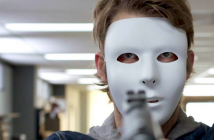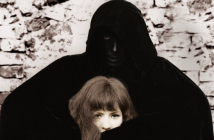Ball of Fire (1941)
Cast: Gary Cooper, Barbara Stanwyck, Oskar Homolka
Directors: Howard Hawks
Country: USA
Genre: Comedy | Romance
Editor’s Notes: The following review is part of our coverage for TIFF’s Ball of Fire: The Films of Barbara Stanwyck. For more information on upcoming TIFF film series visit http://tiff.net and follow TIFF on Twitter at @TIFF_NET.
Someone familiar with the works of Howard Hawks, director of such magnificent comedies as Bringing Up Baby, His Girl Friday, and Monkey Business and superlative dramas like The Big Sleep, Only Angels have Wings, Rio Bravo and many more and the films of Billy Wilder and frequent screenwriting collaborator Charles Brackett, who wrote the Wilder-directed films The Lost Weekend, Sunset Blvd., The Major and the Minor, Ninotchka and Five Graves to Cairo, would never consider the three working together. Their sensibilities were just too radically different.
Hawk’s direction of the Wilder/Brackett script is as sure-handed as it ever is.
However, here is their collaboration: Ball of Fire written by Wilder and Bracket, directed by Hawks (a year before Wilder made his jump from screenwriter to writer/director with The Major and the Minor), an interesting twist on the Snow White and the Seven Dwarves with Gary Cooper playing Bertrand Potts, a grammar professor who is leading a group of seven other professors who are mining the depths of human knowledge, writing a commissioned encyclopedia instead of mining for jewels. Their work is disrupted when a garbage man (Alan Jacobs) comes in to ask some questions for a radio quiz and starts speaking the slang of the day. None of the professors can figure out all of what he’s saying and Potts is incensed because he just finished his article on slang (they’ve reached the letter S in the 9 years they’ve been working on the encyclopedia, with only three or four years left to go) and he realizes it’s completely outdated.

He sets out to gather new slang so his article can be up to date. He lands in a nightclub where he sees Sugarpuss O’Shea (Barbara Stanwick) perform a slang-rich song and he is fascinated. He approaches her after to ask her to be part of a focus group he’s putting together to dissect slang for his article. She initially rejects his offer, but due to circumstances involving her gangster boyfriend, she decides to hide out in the mansion where the work is proceeding and contribute to the article with Potts.
Here she wins over the other seven professors while falling in love with Potts, and he with her, though he has a difficult time admitting it to himself and to her. This is further complicated by Sugarpuss’ boyfriend Joe Lilac (Dana Andrews) proposing via henchmen, a scheme he and his lawyer thought up because a spouse cannot be forced to testify against their partner. At the same time, Potts proposes to Sugarpuss too. When Lilac calls to speak to Sugarpuss, he says it’s her ‘daddy’. Potts, convinced by his compatriots, decides he should speak to her father before the nuptials. Lilac convinces Potts to bring Sugarpuss ‘home’ to New Jersey, where he’s hiding out, so he can marry her.
Many more comic complications ensue in this bright, brilliant comedy. Hawk’s direction of the Wilder/Brackett script is as sure-handed as it ever is. His technique of people talking quickly over one another gives the sense of real conversations, instead of actors saying lines. He pioneered this in Bringing Up Baby and His Girl Friday and continued perfecting it here. Though his framing is standard of the time, his use of photo effects shines through in certain scenes, like when Potts is telling SugarPuss that he had to put a cold compress on the base of his neck to reduce his impulses when the light hit her just so, then it happens again and we get to see it.
Hawk’s real talent was always with his actors. He was able to get wonderful performances out of many of his actors and Cooper and Stanwyck are no exceptions.
Hawk’s real talent was always with his actors. He was able to get wonderful performances out of many of his actors and Cooper and Stanwyck are no exceptions. Cooper plays the bumbling young professor perfectly, attempting to coldly analyze everything and try to keep his emotions out of it. He is content to pursue academia over personal relationships and is most comfortable in the company of his older bachelor companions instead of going out to pursue marriage. Stanwyck on the other hand plays a carefree, vivacious woman who is in the prime of her life and she wants to live it. She falls for his awkwardness and lack of worldly experience and he falls for her worldliness. Hawks handles the whole thing wonderfully.
But it wouldn’t have gone anywhere without the brilliantly zany screenplay by Billy Wilder and Charles Brackett. Of course, Wilder is best known today as one of the great directors, responsible for classics like Double Indemnity, The Lost Weekend, The Apartment, One, Two, Three, Sunset Blvd., Some Like it Hot and many more but few remember that he started out as a screenwriter, often for Ernst Lubitsch before he convinced studio heads to let him make his directorial debut in 1942 with The Major and the Minor. He often crafted some off the wall but tender comedies, like Ninotchka, and this is no different. Brackett was often more hardened but still quite capable of lighter comedy, co-writing Ninotchka and this film amongst others with Wilder. With Ball of Fire, they do the same, giving the film undeniable heart by fleshing out all of the professors along with the two leads. Hawk’s casting of familiar character actors helped bring these realized characters to life and the script feels like they were all treated as lead characters, since they are all vitally important to the story.
There is a tremendous energy throughout the film brought by this supporting cast. Oscar Homolka, Henry Travers, S.Z. Sakall, Tully Marshall, Leonid Kinskey, Richard Haydn and Aubrey Mather are Potts’ fellow encyclopedia writers, while Kathleen Howard plays their stuffy housekeeper and Mary Field their benefactor’s daughter who is now in control of the trust funding the endeavor. Everyone, especially the professors, approach their roles beautifully, and each of them has something to work with.
That energy and the expert use of every actor with not a single line of dialogue wasted makes this one of the great comedies. It’s underseen now, despite its writers and director, but it deserves to be more widely known because of how well done, well-paced and just how funny it is.
That energy and the expert use of every actor with not a single line of dialogue wasted makes this one of the great comedies. It’s underseen now, despite its writers and director, but it deserves to be more widely known because of how well done, well-paced and just how funny it is.



